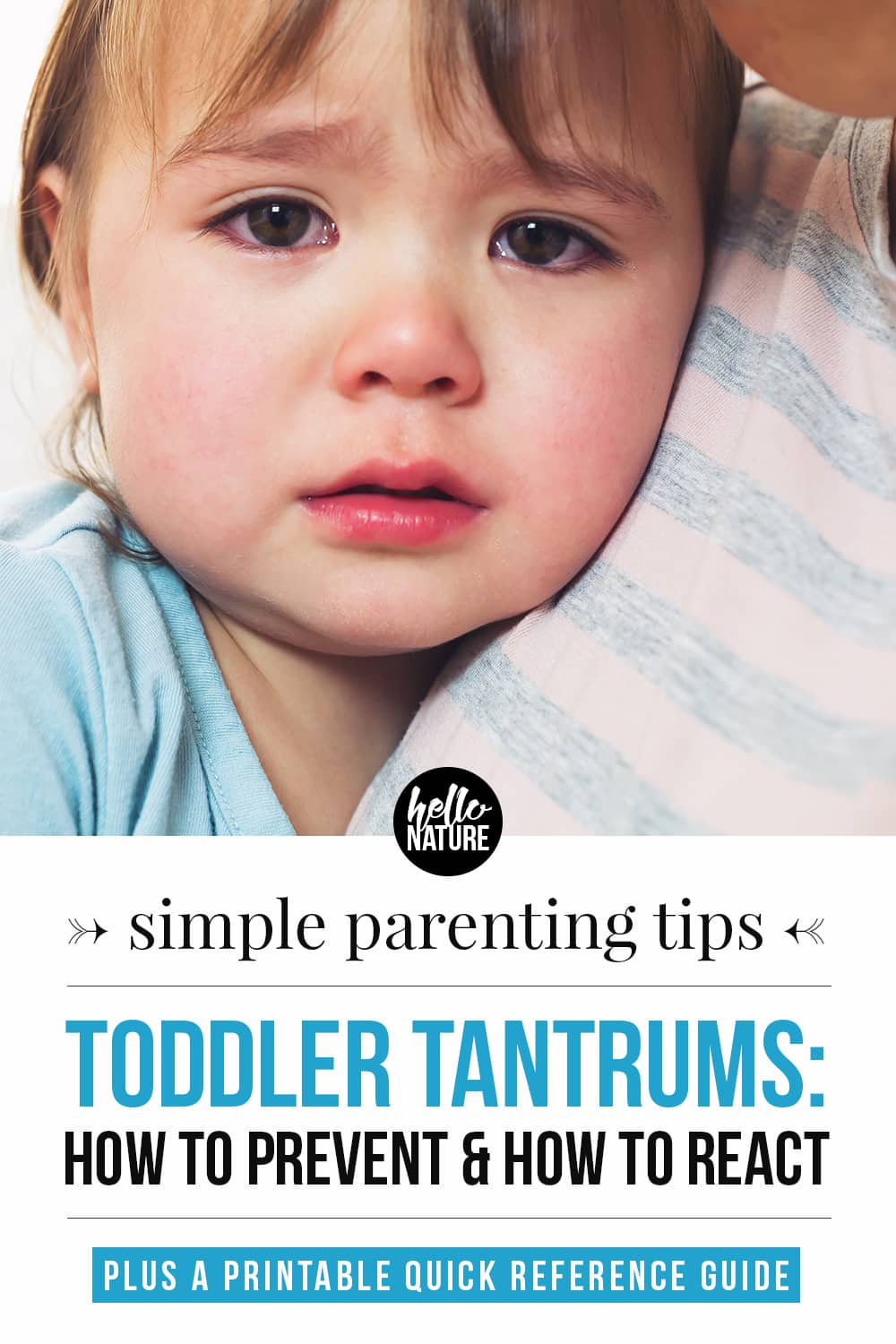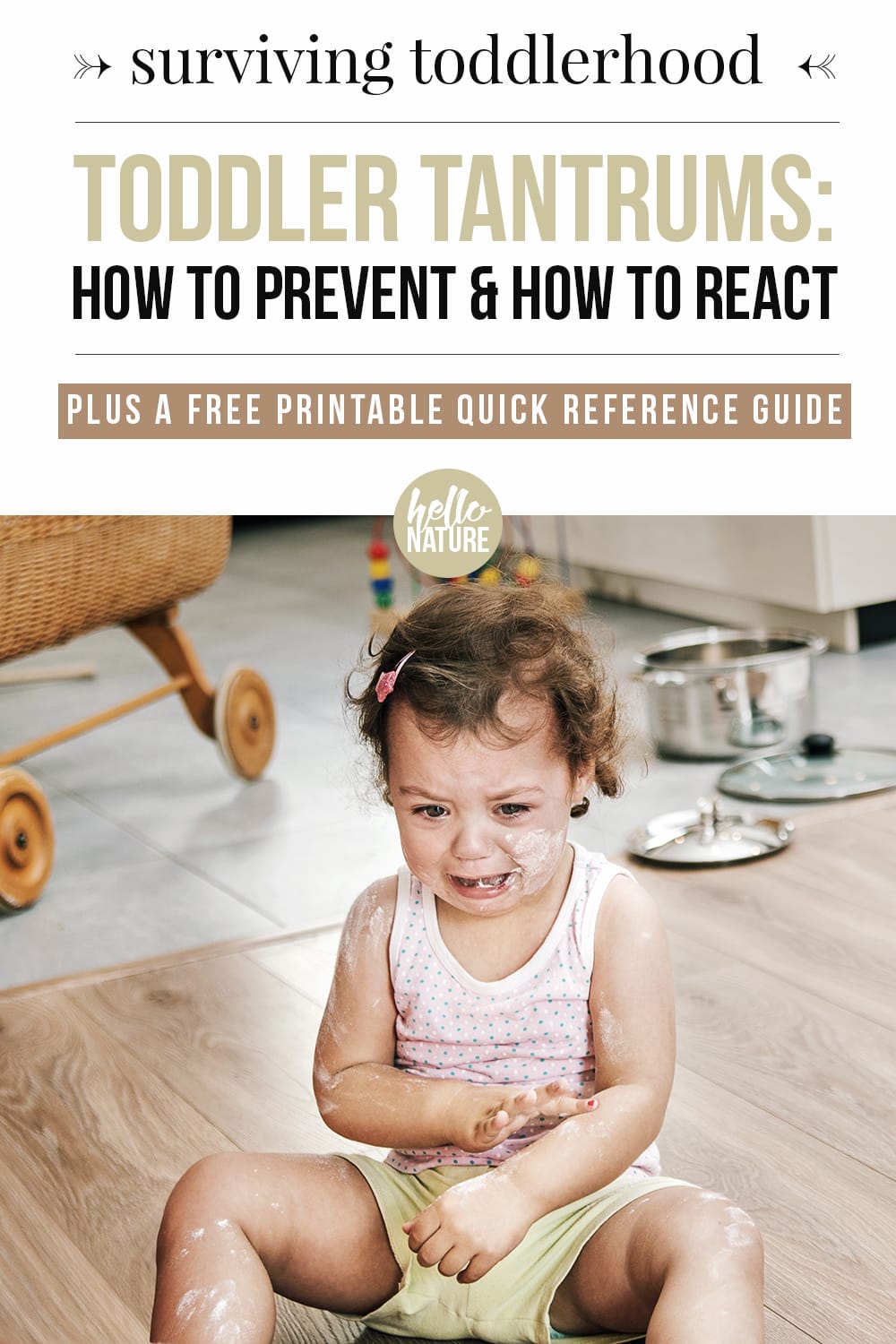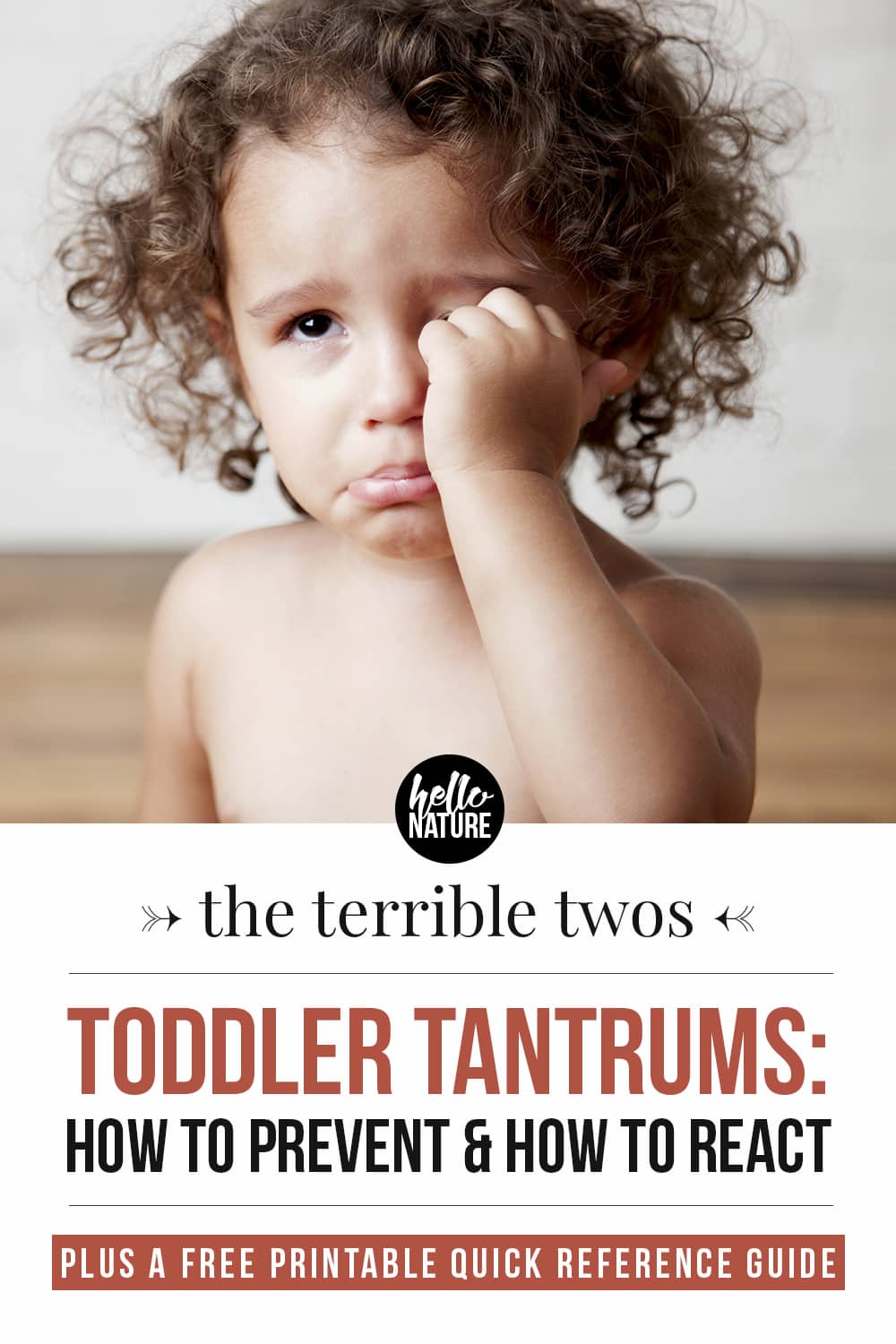Wondering why toddlers throw temper tantrums? Or maybe you’re desperately seeking how to deal with toddler temper tantrums? We’ve got you covered! You’ll learn how to handle toddler tantrums like a pro with this post and the free quick reference printable we’ve included.
Even the best behaved toddlers are likely to have a temper tantrum sometime in their young childhood. It might be as simple as crying or whining all the way to screaming, kicking, hitting, biting or even holding their breath. It’s not fun for them and it’s certainly no walk in the park for you.
Luckily, there are more than a handful of ways to prevent toddler tantrums. And while not all tantrums can be avoided, you can choose how you react to it to prevent it from escalating and even potentially prevent it from happening again.
Table of Contents
Why do small children have temper tantrums?
Before we get into the how to deal with toddler tantrums, let’s explore why toddlers throw temper tantrums in the first place.
The toddler development stage is one that is full of a variety of transitions. Toddlers experience a significant amount of physical and mental development in this stage. Little ones are starting to want to be independent while still needing help with a lot of things. Communication skills are expanding, but it’s not always easy to communicate what they desire. Toddlers tend to understand more than they can express as well.
All of this can lead to a significant amount of frustration for toddlers which can lead to toddler tantrums.
Other things like hunger, lack of sleep, and unrealistic expectations (such as expecting them to complete a task in an amount of time that’s unrealistic for their age) can also lead to temper tantrums.
Toddler ttantrums can also be used to manipulate parents. If they start to see that parents are likely to give in to tantrums, they notice! Eventually, toddlers will see this as a way to get what they want and be more likely to throw a tantrum.
How should parents react to a child’s tantrum?
The key thing to focus on when reacting to a temper tantrum in a toddler is understanding. This is not about a power struggle for them. Keeping calm is crucial to preventing the temper tantrum from spiraling out of control.
Luckily, there are a lot of options on how you can react to a child’s tantrum. Just remember that you know your child better than anyone so it’s up to you to decide which options to try and when they’re best suited for.
Hug it out. Sometimes physical touch can be an immediately stop a tantrum. There are many times where a child just may need to be held and feel loved while they struggle with controlling their emotions. A gentle hug and silence can sometimes diffuse the entire tantrum. And if you’d prefer to speak, let them know that you can help them manage the big feelings they’re experiencing.
If you try this and it feels like it’s making it worse, back off and try a different approach. This is especially true if they are flailing their arms or legs around to the point that you’re getting hurt. You’re less likely to stay calm in this situation so it might not be best for either one of you.
Address their frustration. No matter what method you choose to end toddler tantrums, try to do this – even if the tantrum has gone away. If you don’t know what their source of frustration is or what they want, ask them to tell you or even show you. Once you know what they want, address it. If they can’t have it, explain why and acknowledge their feelings/wants. Letting them know they are heard and that there is a reason (even if it’s a disappointing one) that they’re unable to get what they want can help lessen the severity of nearly any tantrum.
Distract like a pro. Toddlers have a short attention span and while that can drive us absolutely nuts most days, now is the time to take advantage of it. Offer a replacement for the desired object or experience or simply begin a new activity to replace the frustrating one. Sometimes shiny object syndrome is enough to make toddler tantrums disappear.
Need ideas for distractions? Make a beach sensory bin, shark sensory bin, fluffy slime or edible slime with them. Not only will you distract from the temper tantrum itself, you’ll get them involved in something that can be fun and educational!
Choose your battles. Sometimes we get so used to saying no that we don’t actually entertain the idea of buying something or doing something different. Carefully consider what your child is asking for and if it’s not totally outrageous or impossible to do, maybe give it a try! The key to doing this one is to do it before the tantrum begins so they don’t associate the tantrum with how to get something they want.
Ignore it temporarily. Easier said than done, I know. And this is not the ideal option, but sometimes it’s the only option. As long as they aren’t hurting themselves or someone else, sometimes toddlers need some time before they can interact with someone and help solve the issue.
If you’re at home, make sure that your toddler can’t harm themselves and step away. Give them a few minutes to try to work out some of their frustration and then use one of the other approaches to see how you can help.
If you’re in public, it might be best to take your child to your car or to an area away from people to attempt this. Somewhere quiet or private where they can process their emotions better and you can remain calm.
Get a little emotional. Label their emotions. Mirror your child’s actions like folded arms or facial expressions. Show understanding of how they’re feeling in words and actions. You can even let them draw you a picture of the emotion they’re feeling as they get older.
Get them involved in the decision process. This can also easily be used to prevent toddler tantrums, but it’s a great tool when they’re frustrated, too. Suggest which approach you’d like to use to see if they’re okay with it. “Can I hug you and then we talk about how you feel?” “Would you like to do [fun, allowed activity] after you calm down?” “I can see that you are hungry – would you like to have some fruit with me and we can talk about what happened?
And if your first suggestion doesn’t work, then try a different one. There’s plenty of things to choose from that will help your and your toddler overcome the tantrum.
Remain calm. Remain calm. And oh, did I say remain calm? Two temper tantrums do not make a right. And despite the fact that your little one may have taken every last ounce of your patience and understanding that day, this is not the time to lose your cool. I know it may seem like you’re in the middle of the most epic power struggle with a tiny human at the time, but they’re learning from how you react. They’re soaking in how you respond and deeming that to be appropriate behavior.
Respond with love, understanding and as much patience as you can find. Then vent to your spouse later or work it out in the gym. Find an outlet and use that so that when your toddler decides to have a tantrum on the worst day ever, you’ve got it handled.
How shouldn’t parents react to toddler tantrums?
Do not punish. Not only has punishment been proven not to be effective for helping tantrums, it also it more likely to increase the tantrums.
Do not give in. It is so tempting to give in sometimes. In public or at the end of a loooong day, especially. But do not do it. Each time you do this, you’re encouraging the behavior.
Do not try to be louder/stronger. This is not going to help your child feel secure or learn how to better manage their emotions. It will intimidate them and is unlikely to lead to a tantrum resolution.
How can temper tantrums be prevented in toddlers?
Avoid doing things when they might be overtired. Or better yet, avoid letting them get too tired to begin with. Make sure they get a nap and plenty of sleep whenever possible. Regular nap routines and bedtimes may help with this. And if you feel as if they may be lacking on sleep, avoid taking them out of their normal routine if possible.
And if you’re struggling with sleep, consider these co-sleeping products that made a world of difference for us!
Make sure they aren’t hungry. Most adults aren’t super pleasant to be around when they’re hungry, so you can’t expect toddlers to be much different. Keep small, nutritious snacks on hand if you’re out and about and make sure they eat healthy, balanced meals. This one thing, paired with making sure they aren’t overtired, can prevent MANY toddler tantrums before they even begin.
Keep your expectations realistic. Toddlers are capable of doing a lot of things – just not in the amount of time we can do it. Not only are they capable, but they most likely want to do these things on their own as well. Rushing them to do them in a certain amount of time is a quick way to start a toddler tantrum and cause unnecessary frustration on your end. Give yourself and your little one extra time to get ready and let them try to be more independent, only stepping in when absolutely necessary.
Keep a routine. And stick to it whenever you can. Toddlers do well with routine as it helps them feel more secure. You can easily make transitions in the routine smoother. Give them a count down until they need to switch gears (like five minutes until …., three more minutes…, last minute) even if they can’t tell time. If your toddler is more of a visual thinker, consider a timer.
Pay attention to your child’s triggers. Toddler tantrums usually begin with triggers. And more often than not, you can find a pattern in these triggers. Maybe being tired doesn’t trigger a toddler meltdown, but being even slightly hungry does. Or maybe your child throws a temper tantrum when they’re bored. Or maybe whenever you change your routine, your little one has a fit. Pay attention to what’s triggering the tantrum and then focus on how you can prevent it.
Get them involved in the decision process. Does your toddler always throw a tantrum when they get dressed? Ask them to pick out their clothes or have them choose between two outfits. Do they bawl at dinner time? Have them help you make their plate. Does your toddler get upset that it’s time to go to bed? Let them decide what order to do their nighttime routine in or the last book that will be read. Find a way to get them involved and feel as if their voice is heard.
Create a list. One of the biggest toddler tantrum inducing items can be toys. New toys that every kid just has to have. Now as far as they’re considered, they’ve just been put in front of the most amazing thing and can’t have it for no good reason. You may have communicated with them, you may have tried to distract them, you may have even tried to ignore them – but all has failed. This approach is one that serves two purposes – your toddler will feel heard and you’ll have a good idea of what to get them for a gift for a holiday.
Create a list of the things they’re requesting. Experiences or tangible toys – doesn’t matter. You can do it on your phone or in a notebook or even a scrap piece of paper, but it needs to be accessible by them. Add the things they’re desiring to the list and review it every so often with them. You may find things are no longer exciting to them or that things are more of a priority. Either way, they’ll know you’re keeping track of their requests. And then you can use their list for birthday gift ideas or even as they get older and have an allowance to spend.
And if you’re tracking experiences (like going to the zoo or visiting a certain place) – get ready with these tips! Learn how to pack for an all-inclusive vacation with kids or how to plan the all-inclusive trip with toddlers entirely, check out these tips for flying with toddlers, and prepare for a road trip with your toddler (and dog!).
What is the worst age for tantrums in children?
Everyone’s heard of the terrible twos and I’ll bet that a lot of parents have heard that the threes can be even worse. When it comes to tantrums, threes can be worse. Nap time is more challenging and that can lead to some exhausted little ones who struggle to express themselves. Three year olds can also be louder, more disruptive and even tougher to reason with.
Truthfully though, there is no clear answer on what age is worst for tantrums. It depends on the child, the environment, and the parent. Focus on how to prevent toddler tantrums and how to react as a parent to toddler temper tantrums so you’re prepared regardless of age.
What age should temper tantrums stop?
I hate to put an age out there because every child is different. But at the same time, you might be like me, repeating the mantra “the days are long, but the years are short” every day in hopes that it makes these toddler tantrums bearable.
In general, toddler tantrums end with the transition of being a toddler to preschool age which is around age 3-4. This is the age that most children will start to make some big intellectual, emotional and social changes. This means they should be able to start expressing their emotions more which should hopefully mean less tantrums.
Is there something wrong with toddlers that never throw tantrums?
Nope. Nothing wrong with them. Some kids are better at handling their emotions and some are much more mellow than others. And some kids are raised in an environment that will reduce the chances of tantrums.
When do I worry about my toddler’s tantrums?
I said it before, but you know your child better than anyone else. So if something drastic has changed with your little one’s tantrums, consider mentioning it at their next checkup. Consider seeking professional help when a child’s tantrums cause harm, if they’re prone to holding their breath for extended periods or if the tantrums get worse as they reach preschool age. This could be a sign of a medical, social or emotional problem that a pediatrician or family doctor can help in diagnosing.
If you found this guide on how to manage toddler tantrums, please share this below!







